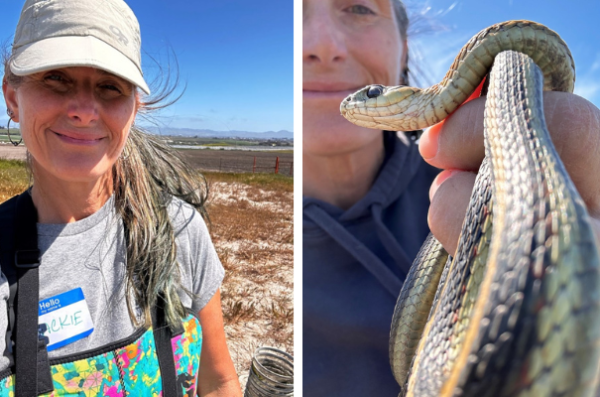Fort Hunter Liggett spotlights wildlife biologist

Wildlife biologist Jackie Hancock.
Biologist finds niche making a difference in species protection, land management
– As a wildlife biologist, with an interest in endangered species protection and conservation, Jackie Hancock had some trepidation about leaving a state parks position and coming to work with the Army.
“I’m very pleased with the path I’m on. It’s been challenging, but I’ve enjoyed the work,” she said of more than 20-year tenure at Fort Hunter Liggett, the U.S. Army Reserve’s largest training installation at 162,000 acres.
“I started working at the state parks in college and made the transition to Fort Hunter Liggett not long after I graduated. I didn’t know what to expect, but the job description caught my eye because it was so diverse. I felt like I was walking into something that would give me a lot of experience in a variety of natural resource jobs. However, I found my passion with the endangered species, and 23 years later, I’m still here!”
Since her start in environmental work with the Army, she’s seen a significant shift in attitudes among both internal and external constituents.
“I have seen a lot of change on the landscape, but what I’ve really experienced is a change in the human perspective,” she said. “When I first started working here, a lot of people thought of us as ‘tree huggers.’ They assumed we wanted to keep the military from training, when in fact the very opposite was true. And the regulatory agencies thought we weren’t concerned about the land enough. Over time we began to see from both sides new interest, curiosity, and appreciation for the work we do.”
Hancock said effective communication has been the key to success for the change in perspective on large-scale species conservation and land-management issues, but also on seemingly smaller issues.
“Just recently we had a request to build a parking lot that would result in the removal of several oak trees. Trees grow slowly here on the West Coast, so we always look for alternative options to removal,” she said. “The easiest solution was to move the parking lot over by about 50 feet. Everyone agreed and seemed happier about the new location. Being able to coordinate and talk through problems improves our working relationships and environment.”
Hancock said her greatest challenge of her career has been managing the conservation and recovery of the federally endangered Arroyo Toad. Threats to the toad’s population are complex and include climate change, drought, predation, and other factors.
“The Arroyo toad has very specific needs during each life stage. It spends most of its life buried in the sand and comes out in the spring to forage and breed in slow-moving, shallow streams. After they are done breeding, they quickly burrow back underground,” Hancock said.
“These conditions are not met every year because of the highly variable rainfall and extended drought conditions. Furthermore, their breeding habitat is dwindling and becoming more conducive to bullfrogs, which prey on the breeding toads,” she explained. “We are at a race against nature to prevent extinction of this population.”
But she is quick to point out that the upsides to her career far outweigh the difficulties.
“I have a lot of pride in the work I do and the people I work with. I don’t do it alone—we have an amazing team of civilian and contracted staff in our Environmental Office. We’ve also had some really great commanders in the last several years who have advocated for our team and have encouraged overall integration and communication among our departments.”
“It makes me really proud to be part of this team, proud of our work, and proud of the Army,” she said, “We are there to support the training mission, but we are also there with our hearts, to conserve the landscape and the species. I can get discouraged at times, but I am always optimistic, and know we are making a difference.”
-By Thomas Milligan for U.S. Army
Comments
The news staff of the Paso Robles Daily News wrote or edited this story from local contributors and press releases. The news staff can be reached at info@pasoroblesdailynews.com.






















